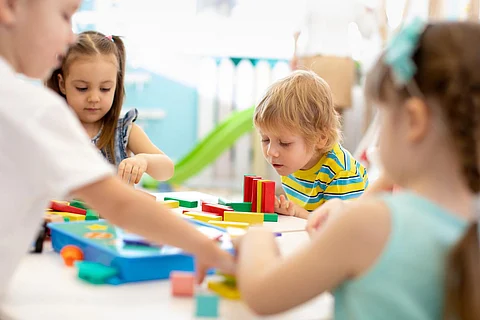THURSDAY, March 13, 2025 (HealthDay News) -- The COVID-19 pandemic set kindergarteners’ development back in several ways, a new study says.
Post-pandemic kindergarten students on average scored significantly lower in language and thinking skills, social competence, and communication and general knowledge, when compared to pre-pandemic kids, researchers reported March 10 in JAMA Pediatrics.
“The domains of language and cognitive development and communication and general knowledge were most severely affected, the likely result of school closures and virtual learning environments necessitated by COVID-19 public health measures,” a team led by Judith Perrigo, an assistant professor of social welfare with the UCLA School of Public Affairs, wrote.
“These measures also limited children’s usual social opportunities with peers and adults who are not caregivers, which may explain the observed slight decrease in social competence,” researchers added.
But the pandemic might have benefitted young children in other ways, with kindergarteners’ emotional maturity and resilience growing during lockdown, results show.
“The increased exposure to adult stressors during the pandemic (eg, COVID-19 casualty counts, financial strain, health anxiety, news coverage) may also account for the increase in emotional maturity detected in our sample,” researchers wrote.
For the new study, researchers analyzed early development scores for more than 475,000 U.S. kindergarten students, comparing pre-pandemic scores from 2018 to 2020 against scores during the post-pandemic era of 2021 to 2023.
“Although we hypothesized that the pandemic would decrease across all … domains, our results suggested a more complex picture,” researchers wrote.
“In a sample of approximately half a million children from 19 states across 14 years, the direction and rate of kindergarteners’ developmental trends varied across domains.”
For example, the study found no pandemic-related changes in children’s physical health or well-being.
The research team also noted that many of these negative developmental trends existed prior to the pandemic, and some actually slowed during the pandemic.
“Although largely still decreasing, rates of change in the post-pandemic onset period for communication and general knowledge language and cognitive development, and physical health declined at a rate slower than in the pre-pandemic onset period,” researchers wrote.
These results “underscore the need for early childhood policies that address these preexisting challenges and the additional stressors introduced by the pandemic,” they concluded.
More information
The Children’s Hospital Association has more on the effects of the pandemic on children.
SOURCE: JAMA Network Open, March 10, 20205


